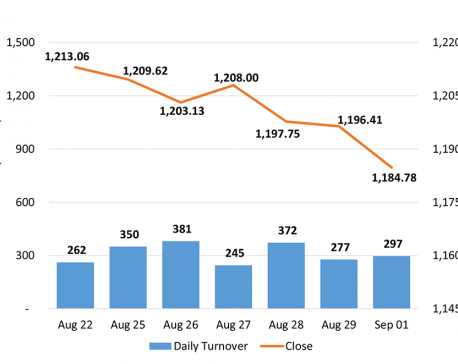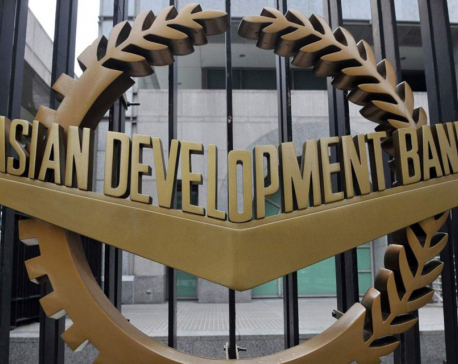
OR
What rupee's free-fall means for country (with video)
Published On: October 7, 2018 06:30 PM NPT By: Sagar Ghimire and Bipana Thapa
Good and bad of stronger US dollar
KATHMANDU, Oct 7; The Nepali rupee has been in a free-fall against the US Dollar since the last few weeks, in line with the collapse of the Indian rupee. The domestic currency fell further to a new low of Rs 118.33 per US dollar on Saturday, from Rs 118.03 on Friday.
One US dollar will now fetch Rs 118.33-- the most ever.
The value of the US dollar has climbed a whopping 15.44 percent, or Rs 15.83, since January 1 , when the greenback's rate was Rs 102.5.
Since the Nepali rupee is pegged to the Indian currency, it is also sinking along with the Indian rupee.
While the appreciation of the dollar is good for Nepal in some ways, the domestic currency's steep slide is going to be a headwind for the fragile economy.
 The recent interest rate hikes in the US attributed to improvement in its economy, India's widening trade deficit and the soaring price of oil have all sent the Indian rupee tumbling against the dollar to record lows.
The recent interest rate hikes in the US attributed to improvement in its economy, India's widening trade deficit and the soaring price of oil have all sent the Indian rupee tumbling against the dollar to record lows.
The continuous upward movement of the greenback is destabilizing emerging economies including India, according to reports in international news media.
The local rupee's slump is going to exacerbate the trade deficit, which is already widening at an alarming rate. The balance of payments position, which is already negative, will also worsen. According to Nepal Rastra Bank data, the BOP-- an aggregate of all the international trade and financial transactions by the residents of a country—was in a deficit of Rs 24.77 billion in the first month of the current fiscal year, 2018/19. Similarly, the data shows that the total trade deficit widened 59.1 percent to Rs 113.69 billion in the review period.
Imports will become costlier as depreciation of the rupee means the country will have to pay more of its money for the same quantity of goods. Rise in the cost of imports also puts upward pressure on inflation as the surge in the price of imported goods is eventually passed on to consumers. Ultimately, its consumers who have to meet the increased costs.
Similarly, the appreciation of the US dollar coupled with rising oil prices in the international market is causing additional losses for Nepal Oil Corporation (NOC) -- the state-owned petroleum supply monopoly.
“The rising dollar and oil prices in the international market will cause a monthly loss of Rs 1.29 billion to NOC,” said Susheel Bhattarai, its managing director .
The surge in the dollar also means the government has to fork out additional money to service its foreign debt. Though the government has allocated a total of Rs 27.94 billion for external debt servicing, the budget is likely to fall short of the repayment obligation. This is likely to require the government to earmark additional funds for the purpose.
Nepal Electricity Authority, another big state-owned entity, is also going to suffer from the rupee rout . NEA has signed power purchase agreements with some hydro-power developers in dollars.
Nepali students going to foreign universities will have to pay more. As they pay for admissions and tuition at their universities and colleges in US dollars, they will have to line up more rupees to cover the rise in the value of the dollar. When the dollar's value increases, the students end up paying according to the increased rate.
However, some sectors stand to gain from the stronger dollar.
The export industry is the biggest beneficiary of a stronger dollar. The appreciation of the dollar means that the price of Nepali goods will look cheaper in the international market, driving up demand. This can also encourage the export sector to boost production and utilize capacity to the full , according to trade circles.
The tourism sector and those receiving remittance money can also find cheer in the weakening of domestic currency . Those who earn dollars or whose salaries or payments are fixed against the dollar even within Nepal will see windfall gains. If the domestic currency continues to weaken, people will be discouraged from demanding luxury goods or other non-essential imports due to the high prices.
You May Like This

Nepal imported fruits worth over Rs 11 billion in the first nine months of current FY
KATHMANDU, April 25: Although agriculture has been a major sector of the country's economy as the main source of livelihood,... Read More...

Market tumbles as insurance, energy stocks falter
KATHMANDU, Sept 2: Stocks began September on a weak note as the local bourse struggled throughout the trading session on... Read More...

ADB's forecast of 5.5 percent growth lower than that of govt
KATHMANDU, Sept 27: Asian Development Bank (ADB) has forecast Nepal's economy to grow by 5.5 percent in Fiscal Year 2018/19. ... Read More...




Just In
- Gold price increases by Rs 1,700 per tola
- KMC warns of action against those strewing construction materials on street
- National Vitamin 'A' campaign being organized on April 18 and 19
- Two killed in separate accidents
- Seven parliamentary committees meeting today
- NC aggrieved over leader Neupane's demise
- Bhaktapur industrial festival collects Rs 80 million proceeds
- Chaite Dashain being celebrated by worshiping Durga Bhawani today














Leave A Comment